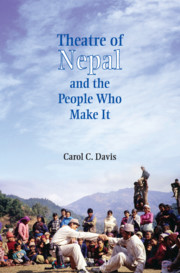Book contents
- Frontmatter
- Dedication
- Contents
- List of Figures
- Acknowledgements
- Prologue
- 1 From Darkness to Light: Antiquity through the Malla Golden Age
- 2 Ruthless Rulers: The Rise of the Shah and the Rana Takeover
- 3 The Drama of Nationalism: Sama Engaged
- 4 Modernism's Advance: Post-Sama Dramatists
- 5 The Pro-Democracy Movement: Ashesh Malla Takes to the Streets
- 6 Cultivating Theatre Aesthetics: Sunil Pokharel's Vision
- 7 Diaspora: Urban Theatre Outside the Capital
- 8 Legacy: Contemporary Theatre in the Kathmandu Valley
- Bibliography
- Index
4 - Modernism's Advance: Post-Sama Dramatists
Published online by Cambridge University Press: 26 April 2019
- Frontmatter
- Dedication
- Contents
- List of Figures
- Acknowledgements
- Prologue
- 1 From Darkness to Light: Antiquity through the Malla Golden Age
- 2 Ruthless Rulers: The Rise of the Shah and the Rana Takeover
- 3 The Drama of Nationalism: Sama Engaged
- 4 Modernism's Advance: Post-Sama Dramatists
- 5 The Pro-Democracy Movement: Ashesh Malla Takes to the Streets
- 6 Cultivating Theatre Aesthetics: Sunil Pokharel's Vision
- 7 Diaspora: Urban Theatre Outside the Capital
- 8 Legacy: Contemporary Theatre in the Kathmandu Valley
- Bibliography
- Index
Summary
For a long time, this fire has been burning within me.
—Gopal Prasad RimalNepal's sudden opening to the outside world brought to the literati new theories of society, psychology, and philosophy. The social realism of Norwegian playwright Henrik Ibsen (1828–1906) found its way to the sequestered kingdom and exerted a powerful influence on modern Nepali dramatists. Guided by the pioneering efforts of Balkrishna Sama (1903–1981), young dramatists eagerly turned from traditional, historical, and mythological topics to the social commentary and psychological explorations of European naturalists, realists, and existentialists. To critique society in dramatic form, playwrights went beyond Sama's poetic idealism towards the possibilities inherent in realism. Absorbing the work of the European theoreticians and artists, and following the path that Sama carved for them through the jungles of Parsi-imitation and frivolous entertainment, the dramatists of Nepali modernism (Uprety, 2007) arrived at geo-centric themes, psychological explorations, and relatively realistic characters speaking in their native tongue—unheard on the stage before Sama's ground-breaking work. In Professor and playwright Abhi Subedi's words, dramatists became ‘interested in the individuality of the character whose main conflict is with the society and also with various impulses within his or her own mind’.
Sama urged Gopal Prasad Rimal (1918–1973) to read Ibsen's plays and to pay attention to the ‘themes of social and family values and the pain and struggle between men and women’ (Subedi, 2006: 127). Now considered Nepal's ‘first naturalistic playwright’ (ibid.: 99), Rimal appears to have written his play Masan (Cremation Ground, 1946) under the influence of the Norwegian naturalist playwright, although the degree of Ibsen's presence in Rimal's Masan has been debated in Nepal in the decades since its initial production. When Nepali scholars speak of Ibsen's impact on dramaturgy, it seems they actually mean the influence of one play in particular. Et dukkehjem (A Doll's House, 1879) more than any other Ibsen play appears to resonate most deeply with Nepal's theatre makers, audiences, and scholars. Little is written about the effect of other major Ibsen works such as the romantic Brand (1865), the folkloric Peer Gynt (1867), Ibsen's first contemporary realist drama, Samfundets stotter (The Pillars of Society, 1877), or his symbolic masterpiece, Vildanden (The Wild Duck, 1884).
- Type
- Chapter
- Information
- Theatre of Nepal and the People Who Make It , pp. 40 - 48Publisher: Cambridge University PressPrint publication year: 2019



